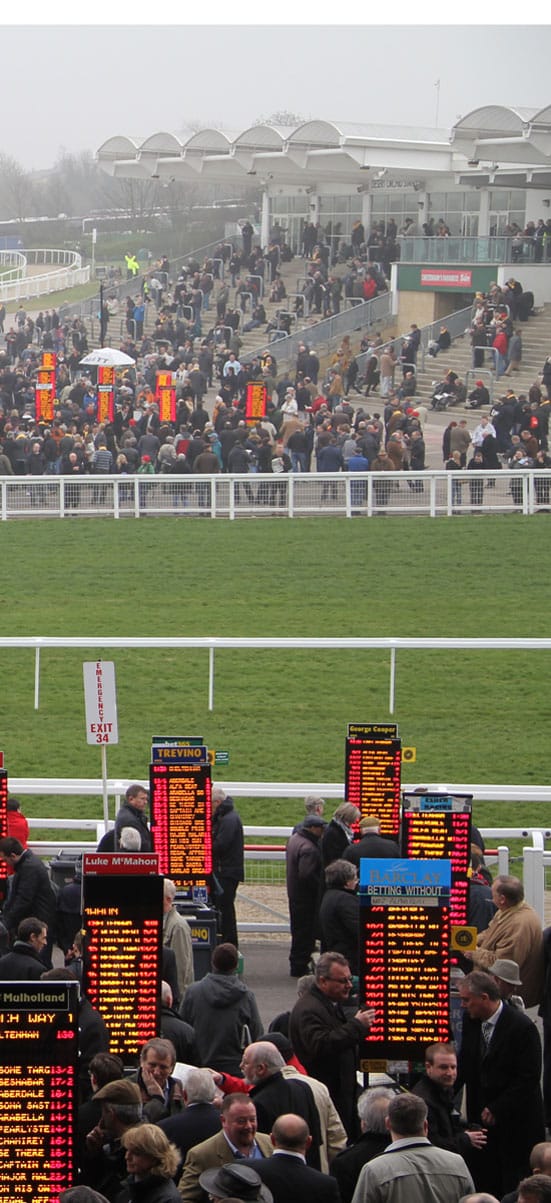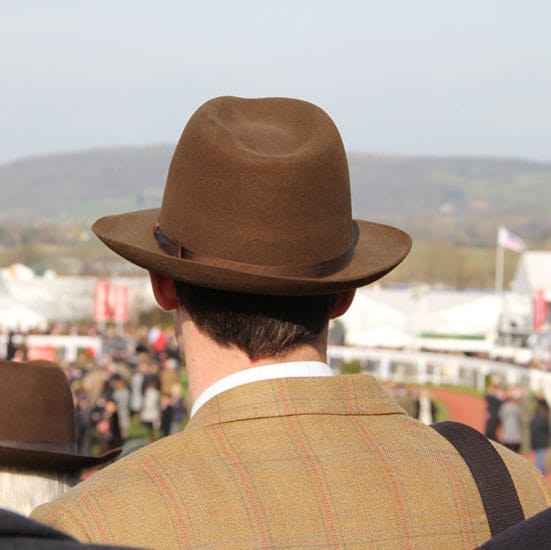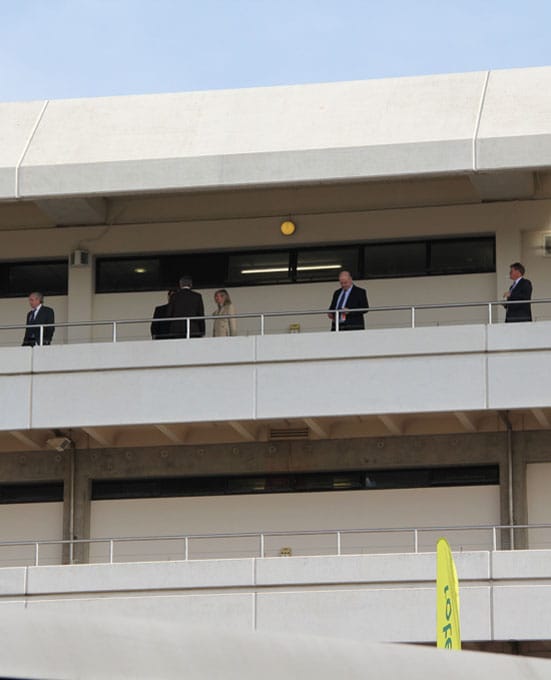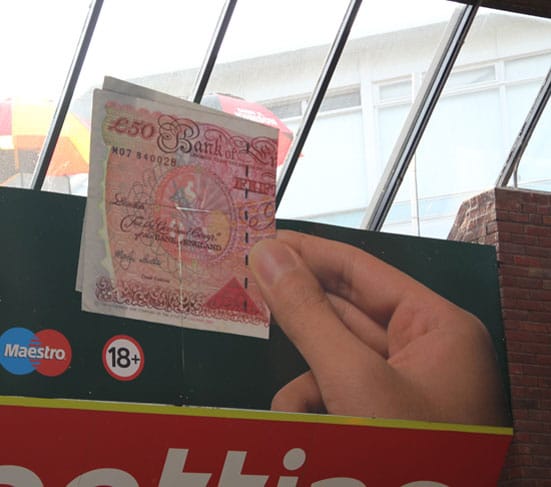Cheltenham Festival is a four-day race meeting and one of the biggest events in the British horseracing calendar. Thousands of spectators pour into the small spa town each year, as well as all the trainers, owners, jockies, casual service staff and, of course, the horses. As the day's racing runs from 1pm to around 5.30pm, the town is full of visitors outside these times, every pub bulging by 6; the streets packed with jerkily promenading crowds. The festival coincides with St Patrick's Day, so the place is awash with promotional Guinness hats, etc.
The walk in the morning up to the racecourse from the city centre is a long trudge. The gathering crowd is almost entirely male, despite this being ladies' day. Large groups of younger or older men strut or plod their way up the road, discussing spurious-sounding racing tips or the previous night's entertainments (measured in pints, chat-ups or instances of vomiting). Touts linger everywhere – 'I buy tickets, I buy tickets – I will buy any tickets'; every woman under forty from the entire county seems to have been employed to fling flyers, free papers and scarves at the passing marchers.
It's a long time since I've been surrounded by so many gangs of men, shouting, sweating, drinking men. Generally I find prescribed 'fun' quite awkward, especially when it centres on consumption – everywhere there is Guinness; various variations of pork and bread – because that's what a day at the races is all about. Horrific conformity – This is what you want. I have come to the festival with a male friend, so in a way we are totally typical – young men on a daytrip to the races – we might not be wearing suits, but we feel perhaps we should be; we head straight for the bacon roles and lager offered, relishing the excuse for wrong, daytime consumption of alcohol. We decide that we at least aren't interested in betting today – the purest and simplest way to dispose of cash, which does seem to be the primary objective today.
The queues at the bar are mirrored in the queues for the toilets (longer waits for men than women) – the dank, dingy, reeking rooms as rowdy as the rest of the building, although not loud enough to hide the sound of coke enthusiastically and communally being snorted in the cubicles. Maybe I should have brought some coke? Architecturally the buildings of the complex are somewhere between ferry terminal and leisure centre, only with bookmakers everywhere; every possible space an opportunity to bet. I watch one race in a low ceilinged room, old TV monitors hung from it, the green of Totesport, pervasive. Glamour eludes me.
The races offer a strange breed of spectatorship, one in which the ostensible object of attention (the horses) are diffuse images, a nominal centre only. Visual attention is divided between several huge TV screens, betting slips held in hand, or the distant coloured dots of the racers – at climactic moments, voices are directed in an equally divided fashion – 'Come on!' at this or that television, or off into the distance towards the track; 'Come on!' at the slips of paper in the hand. Bookies stand on boxes and shout into the crowd 'Push through if you want to bet' – several are dressed in flamboyant colours, like stock traders.
The race experience is, literally, stratified. The ticket I have allows me to the lower two levels of the stand building, above us are the club-only areas, and above that, even more exclusive accommodation. I cannot remember ever having seen class performed on such a large scale, with such diligent conformity to dress codes. Young mock-neys dress Topman-Mod, silver grey suits, pointy black shoes, The Racing Post under the arm, gelled hair. Cotswold country-money dress in green or brown tweed jackets, pale trousers, brown hat (there are tents in which to buy these items for the moneyed gent caught short in the tweed department). Between races, whilst the suited and booted lads are heading for beer or pork or both, the tweed-wearing man heads for the stables, to pay careful attention to the animals, considering their form and his next bet, which will be placed calmly and quietly. These two uniforms denote two distinct sensibilities. The country gent loves tradition, English country air and animals (as admirably fine and powerful beasts, but primarily as commodity, to be appreciated by a connoisseur). Then the urban entrepreneur, the connected, young, slightly preening man, receiving racing tips by mobile phone, checking the paper. I'm not sure where I am in this constellation, and eventually decide that if I belong here at all, it's probably behind the bar, or serving bacon roles.
I stand next to the edge of the end of the course, and watch a rider-less horse trot past – wide eyed, flanks steaming in the cold air. Although filled with the angst of being out of place, the prevailing feeling at the festival is boredom – a feeling not restricted to me, I think. The races are not fun. Grey faced older men, not dressed up, alone or in pairs, hang around between races, not shouting, not drinking.
On the walk back to town in the evening, the flyers flung my way are now all for strip clubs and lap dancing – apparently, temporary licences for these places are given over the festival; for homosocial leering. Perhaps we should go too, maybe?
Richard Whitby
Richard Whitby currently holds a residency at Meantime Gallery, Cheltenham, ending with an exhibition of new work at the end of April.

Cheltenham Race Course
Photograph by Richard Whitby

Posh Uniform
Photograph by Richard Whitby

The Seats With More Expensive Views
Photograph by Richard Whitby

Money
Photograph by Richard Whitby